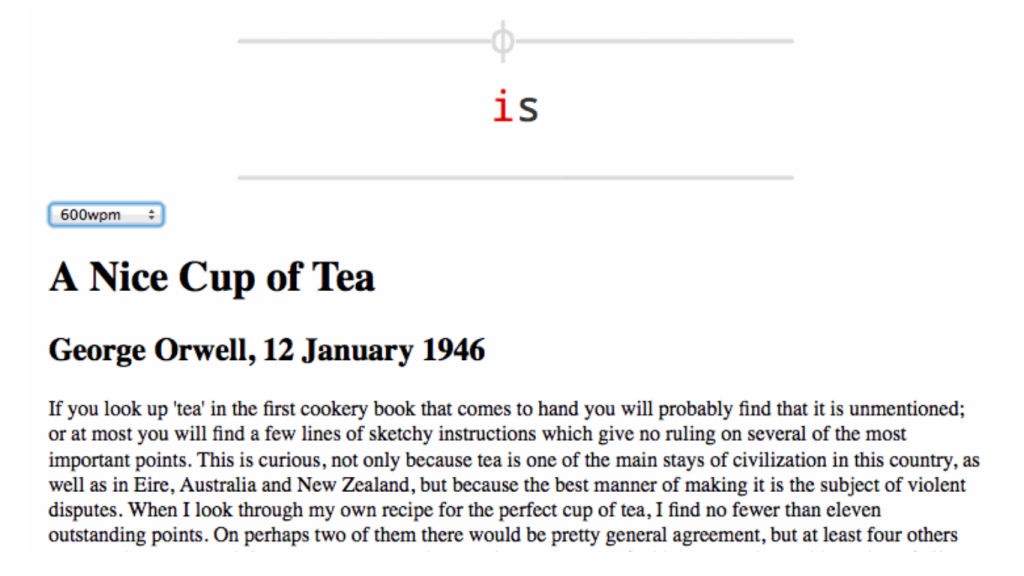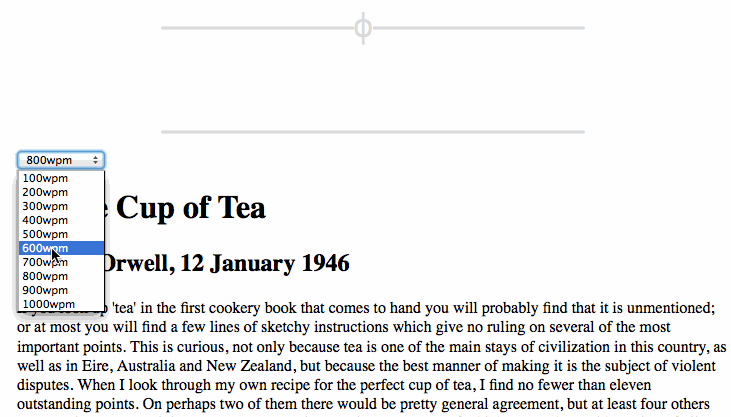
OpenSpritz – a Spritz bookmarklet for speed reading
Today, I’m pleased to announce OpenSpritz, a free speed reading bookmarklet.

NOTE: this article was originally published in 2014 and may contain deprecated code. If you’d like to receive up-to-date information about projects from the Gun.io team, sign up for our no-B.S. newsletter.
To install OpenSpritz, simply drag this button to your bookmarks toolbar and then press “OpenSpritz this!”
It should then open up the OpenSpritz view, then just select a speed and start reading! (Note: If for some reason the article extractor doesn’t work, you can also select the text you want to read before choosing a speed. Annoying, this very page is one of the ones it doesn’t work on and I don’t know why yet.)
Woosh!
Spritzing isn’t the same as normal reading. The whole point is to avoid saccades, the little micro-movements your eyes make as your read text. With Spritzing, you simply relax and let the words flash into your brain! (There’s some more information about the Spritz system over at the Spritz blog).
It creates a much nicer, “lean-back” type experience. It’s actually kind of like watching television, only with words. Some speed-readers say to avoid “subvocalization”, the mental “reading aloud” that we do while reading text, but I actually find that I can still subvocalize, even at high speeds, and that doing so helps improve both my enjoyment and comprehension of the text. Because OpenSpritz is grammar-aware (delaying for commas, punctuations marks and longer works), it reads much more naturally with subvocalization than some other speed readers.
I have quite poor vision, so for some reason I find Spritzing to be a lot more pleasurable. I can also read considerably faster. I started at 600 WPM but can now comfortably read and comprehend at around 800WPMs, compared to my normal reading speed of 150-200WPM.
Features
OpenSpritz is written entirely in JavaScript, and it should work on every page on the web (barring a few known exceptions). It uses the Readability API for content extraction, and will also work for the text which is currently selected.
It’s also completely open source, and if you’d like to contribute, please check it out on Github!
Disclaimer / Guilt
OpenSpritz is in no way affiliated with Spritz Incorporated, the developers of the Spritz reading system.
I made the first version of OpenSpritz in about 15 minutes at 3 in the morning after reading about Spritz on HackerNews. I immediately fell in love with the technique and wanted to use it as part of my daily workflow. Unfortunately, Spritz’s official version isn’t actually released yet, so I had to make my own. The concept is actually incredibly simple, which made it very easy to reproduce (even while sleepy and a little drunk.)
Now, this makes me feel really weird since I really like Spritz as a company and I don’t want to hurt their chances of succeeding as a startup, but I also want to use it myself without waiting. (Considering that I haven’t even announced it publicly yet and at the time of writing there are over 70 stars on Github, it seems like there is some considerable community interest in this as well.)
I’m not in any way trying to profit off of this project, I made it for myself and for the community. I hope that Spritz Incorporated will be able to use this project as a form of validation for their future products, which I assume will be far more polished than OpenSpritz.
Mobile
Fortunately for Spritz Incorporated, the future of content of content consumption is mobile. The Spritz system is a perfect fit for mobile and wearable computers, and I’m sure they’ll be able to deliver awesome products to mobile platforms.
I should also note that there is already an Android port of OpenSpritz which can read ePubs. It’s so awesome. I was able to pleasurably snarf down the first five chapters of Snow Crash at 800WPM during the time it takes to get from SF to Berkeley on the BART, and had two interesting conversations about the future of reading with curious strangers along the way.
So, there you have it! Spritz’s goal is to have 15% of the world’s text consumed in this format in the next five years. It’s ambitious, but I can certainly see how Spritz could really take the world by storm.



